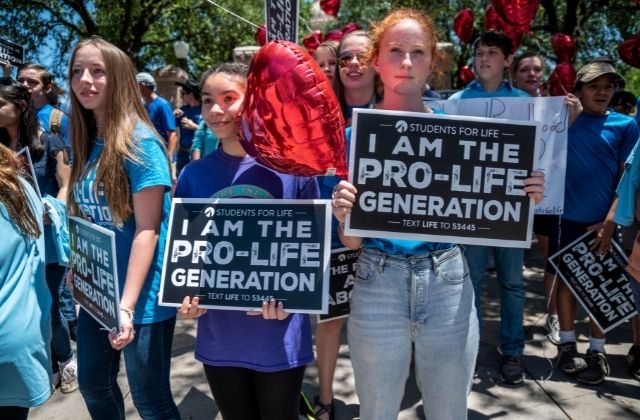As conservative lawmakers continue to push anti-abortion legislation across the country, Texas is spending an exorbitant amount of taxpayer money to encourage people not to have abortions. The 16-year-old Alternatives to Abortion program, which was initially given “a few million in federal anti-poverty dollars,” is set to receive $100 million in taxpayer money over the next two years, Salon reports.
Opponents of the program, which claims to offer assistance to anyone who decides to "choose life in difficult circumstances,” say that the conservative Texas State Legislature is being tight-lipped about what the program has accomplished and why it deserves a twentyfold budget increase. "I don’t know if this is untouchable by design," state Rep. Bobby Guerra (D-Mission), told Salon. "If they have good outcomes, I would think that they would be proud of sharing that information."
According to Salon:
Critics say Alternatives to Abortion has eluded accountability in the often fiscally conservative Legislature, which this year requested a study on how to make safety net services cheaper and better. At the program’s worst, critics allege, it shames women seeking abortions and is a poor and expensive substitute for women’s medical care.
Republican lawmakers in the state have pushed through this massive budget increase, claiming that the program has been wildly successful. “Alternatives to Abortion channels money to a far-flung network of nonprofits — many of them ardently anti-abortion — to pay for counseling, classes and baby items,” Salon reports. “Its contractors cover topics like prenatal nutrition and newborn care, and also help parents land jobs. It caters to pregnant women and mothers of young children but also to fathers, adoptive parents and those who have lost a child.”
Lawmakers have over the last serval years siphoned money from various other programs to fund this anti-abortion program. According to a 2019 letter written by 80 lawmakers in Texas, “the state prioritized the availability of Pro-Life alternatives" over the years. In 2017, for example, Salon reports they gave Alternatives to Abortion $20 million from an air quality program. In 2021, they sent the organization another $20 million from a health technology budget. “When other programs lost state money in 2011, Alternatives to Abortion was spared,” according to the news outlet.
Critics of the program, including Democratic lawmakers, are desperately trying to determine the cost-effectiveness of Alternatives to Abortion. Judith Zaffirini (D-Laredo) told Salon that the program was born in 2005 with "minimum standards, adequate oversight" or even a requirement that "the information provided to women be medically accurate." Additionally, she said, lawmakers aren’t given enough data to assess the success of the program.
Salon reports that, while “spending on traditional women’s health programs that help low-income women get birth control or access cancer screenings is on track to almost triple since the abortion alternatives program began,” abortion rights and women’s health advocates insist “there is still unmet need.” Critics say Alternatives to Abortion takes money that would be better spent elsewhere.
Salon reports:
In written testimony, residents of South Texas said lack of affordable health care in the predominantly Latino region meant women couldn’t get biopsies or treatment for cancer and other serious conditions.
rn
rnA Nurse-Family Partnership program has asked for Alternatives to Abortion funding, saying its mission of pairing low-income mothers with a nurse during pregnancy and for a few years after they give birth fits squarely within the goals of the anti-abortion program.
"We are prepared to fill the gap of health care and education services needed by pregnant mothers that the current program does not fully provide," a representative of the nurse program said in written testimony.
Former state Rep. Sarah Davis (R) told Salon that, as someone who supports abortion rights, she believes the lack of transparency around this heavily-funded program is “very deliberate,” and that funding the program had felt like a "trade-off” when she worked as a lawmaker.
"If I wanted to get the money that I wanted for the Healthy Texas Women program, breast and cervical cancer and family planning [programs]," she said, "then I also had to go along with the Republicans wanting to dump money into Alternatives to Abortion."
